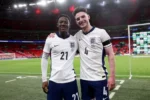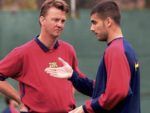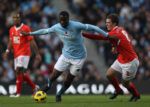Abstract: Jose Mourinho needs to be bold and embrace the audacity of pragmatic football instead of its weaknesses or else the future will belong to Cruyffism and Pep Guardiola.
Act 1 — Jose Lannister
Note- Game of thrones spoiler alert
In the first novel of the iconic A Song of Ice and Fire series, before pushing young Bran Stark off a secret tower in Winterfell, Jaime Lannister famously told his sister Cersei:
“The things we do for love.”
Simple as this sentence is, it exemplifies — for better and for worse — the Lannisters’ Machiavellian-ism: the end always justifies the means. It is precisely that philosophy that makes Cersei perhaps the most hated character of the series but also by far its most compelling. Jose Mourinho, football’s most compelling figure of the last twenty years, reminds me of Cersei: a brilliant man capable of harvesting his worst instinct to achieve a goal because the end always justifies the means, however vile those means might be.
Perhaps more interestingly, opinions on both Jose and Cersei seem to always be divided in two radically opposed camps. The more idealistic Game of Thrones readers detest Cercei, they see her as evil. The purist football observers cannot see Mourinho’s magic even when he is winning, many of them tame him as the dark lord of Antifutbol.
Despite, her obvious diabolical nature, I still love Cersei. In the Winds of Winter episode of Thrones, she unexpectedly devises and executes a plan to murder thousands of people in order to survive politically. It was a glorious scene to watch and the Great Sept explosion remains my all-time favorite television moment. It represents the triumph of pragmatism, cleverness and evil. The High Septon was playing baseball, Cersei on the other hand, was winning a third round of eight dimensional chess against herself.
The Great Sept explosion remains the greatest moment in Television. The execution of those scenes and the music will always stay with me
The Special One has had his Great Sept Explosion moment. His football mic drop came against Barcelona in Inter’s 2010 Champions League winning run:
Mourinho’s celebration was the Special One’s grand standing at its best or worse depending on how you look at it. There is context to his grandstanding: In 2008, Mourinho wanted the Barcelona coaching job. After his interview, he even asked FC Barcelona president-at-the-time Laporta to get in contact directly with Cruyff, who apparently had final say on the decision. He was ultimately passed from the opportunity for Pep Guardiola.
It was one of the most intensive (defensive) moments in modern football. On the second leg of this encounter, Michael Cox wrote:
“There are times when the hype about Jose Mourinho is frustrating and cliched, there are times when it is fully deserved. Tonight was the latter in one of the great defensive performances in recent footballing history.”
The Camp Nou celebration was more than seven years ago, at a time when football was looking for an answer to the Barcajax’s school of thought, at a time when it seemed all teams should bend over and let the gods of Barcelona dominate the world. It was a refreshing and courageous response, seven years ago such positive words still applied to Jose.
Despite all of his antics, his penchant for the melodramatic, his obvious lack of self-awareness, I am a Mourinho fan. He is still capable of getting the job done. His cleverness and understanding of football are criminally understated by purists. Last year, despite poor performances in the premier league, United won three titles. Mou even made the right call to focus on the Europa League, on the way beating a Cruyfist Ajax team and earning the right to play the Champions League.
With that said, I am not a Mourinho apologist. After the atrocious displays against Manchester City, Liverpool and Chelsea this season, it is time (for me) to acknowledge that Guardiola may have won the battle of ideas in modern football. Mourinho may have been the coach of the 2000s but until he adapts, until he shows innovation in his approach like he once did, the future will belong to Pep.
Act 2 — Audacity
Mourinho’s teams have always been unquestionably reactionary.
It’s probably why my friend and founder of Ayibopost, Jetry Dumont never understood the hype behind Jose. He cannot comprehend why some people would ever rate Jose ahead of Pep because he views Jose as primarily negative coach.
Jetry is a principled cruyffist and although, he correctly predicted City would be the better side a year ago; his criticism of Mourinho can be sometime misguided. Reactionary Football mustn’t be the equivalent of Parking the Bus Football and some Mourinho sides have been genuinely dominant teams that played innovative football.
When Mourinho arrived in England in 2004, the best leagues in the world were La Liga and the Calcio. The premier league was dominated by an already-antiquated 4–4–2 and by Arsene Wenger’s last glory days. Chelsea had not won the title in fifty years. 2004’s remarkable Arsenal side and Ruud Van Nistelrooy’s criminally underrated brilliance excluded, Premier League football was mostly dull.
Noticing the weaknesses of the 4–4–2, Mourinho effectively deployed a deadly 4–4–3 formation centered around a combative midfield and efficient wide players, similar to the system he had implemented with Porto the year before. The following two years, Chelsea annihilated everyone in the league an incredible achievement considering they weren’t the most talented team in the league. However, Chelsea most definitely played the most brilliant football. They blitzed the opposing team with high pressure, they controlled the pace of the game and they often orchestrated superb counter attacks.
It captivated my imagination as a kid. “How can a team with Mateja Kezman and Damian Duff be this good? When did Frank Lampard become a top 5 player in the world? Wasn’t Chelsea just the cute English club where Zola and Desailly played?” were questions I kept asking myself.
Mourinho knew his system gave him the edge. On the 4–3–3, he once said:
“Look, if I have a triangle in midfield — Claude Makelele behind and two others just in front — I will always have an advantage against a pure 4–4–2 where the central midfielders are side by side. That’s because I will always have an extra man. It starts with Makelele, who is between the lines. If nobody comes to him he can see the whole pitch and has time. If he gets closed down it means one of the two other central midfielders is open. If they are closed down and the other team’s wingers come inside to help, it means there is space now for us on the flank, either for our own wingers or for our full-backs. There is nothing a pure 4–4–2 can do to stop things”
No better games exemplified Mourinho’s success with Chelsea than his title sealing 3–0 victory over United in 2006.
In 2006, Chelsea dispatched Alex Ferguson’s United 3–0 to win the Premier League for the second time in a row
On equal footing, Chelsea’s 2005 victory over Ronaldinho’s Barcelona was another example of Mourinho’s masterclass and a showcase of his rejection of the basic tenant of Cruyffism. All throughout that night, Chelsea overwhelmed Barcelona, out-muscled them in the midfield, disturbed their passing and most importantly made them pay on the break.
https://www.youtube.com/watch?v=Idnjyvtu8Jg
The 2005 Barcelona-Chelsea matchup was one of the most thrilling games of the last decade.
Those two games were not tiki-taka victories but even while playing their reactionary game, no one could say that this Chelsea team approached any game with fear. No one could deny that this Chelsea team was the best side in the Premier League and one of the three best sides in Europe.
In the last two years, if we exclude one surprising victory against Chelsea last year in the league, there has not been one big game Mourinho approached with an attacking mindset. I’m not talking about possession football, one can have an attacking mindset without dominating the ball as clearly expressed by his early FC Porto and Chelsea sides. Inter Milan went for-and-scored 3 goals against Barcelona in 2010 playing a reactionary game.
Nowadays Mourinho approaches those games with fear. Fear that his team can’t attack, fear that his team can’t win playing its own game, fear of the opponents’ strengths. What’s most disappointing about the City loss is that United is perfectly capable of playing them in an open game. City is the superior team but I can’t help but feel that Mourinho has lost his ways.
In his remarkable essay Educating Decision Making, Mattew Whitehouse summarizes the situation best:
“No wonder he (Mourinho) embraces the ‘big games’ in the way he does, he is scared of making a mistake, scared to trust his players to embrace their talent and play. He doesn’t trust them. He reduces what they can do out of fear. And what happens? They play with fear. Oh the irony!”
How can you win when you don’t respect your own player’s talent?
Act 3— The Old Giant Has Lost a Step
The season is young and we all know Europe will determine our final evaluation of success but it is evident that Guardiola has been the best manager in the world this season.
The quality of City’s play this season has marveled everyone who loves the beautiful game. The Brits aren’t used to seeing this type of football on a weekly basis, but they know greatness when they see it. Even the most dominating English teams of the last twenty years didn’t produced this type of offensive aesthetic.
The Brits appreciate beautiful football, they know it when they see it. In 2003, the Old Trafford gave Ronaldo a standing ovation after he scored a hat trick against United. David Beckham recalls this moment as one of that made him proud to be a United player.
Many people were skeptical about his methods but Guardiola has successfully imported Cruyffism and the results are scintillating: 18 consecutive wins in the league, a foot in the Champions League’s quarter finals and most importantly no Premier League team seem to have an appropriate answer on how to counter. Jonathan Wilson wrote that City’s dominance have rendered their games predictably boring.
City’s commitment to Pep’s ideology is admirable but what’s even more impressive about his team this season is seeing how many of his players have improved. City’s defense is still a collective mess but it’s undeniable that their best players are better today than they were two years ago. Whitehouse touches on some of those players’ improvement in his essay: Sterling and Fernandinho have never looked so good while De Bruynes and Silva are now unquestionably world class.
A great manager knows how to place his players in the best position to succeed. He understands how to get the best out of his best players. Ironically it is an aspect Mourinho used to excel at. Maicon, Sneijder, Lampard, Makelele, Lucio, Michael Essien, Julio Cesar and countless others played world class football under him.
Frank Lampard once said of his time with Mourinho:
“Yes I was a complete disciple (of his),I mean that’s why he was so good when he first came. We were all about 24–25, hadn’t won anything and all of sudden Mourinho comes in and says ‘We’re going to be winners now’ and we all replied (in awe) ‘yes boss, of course boss’ we followed him”
How many players today in United are as devoted to Jose as Lampard was back in 2005? I suspect the answer would be zero although to be fair Herrera(last season) and Lingard have improved under him.
Other questions are fair to ask but let’s focus on these few: how would Paul Pogba, one of the world’s ten best raw football talents, fair in a Guardiola system? Are we sure Juan Mata wouldn’t look like David Silva with Guardiola at United’s helm? Would we get a true breakout season from Rashford and Martial?
I don’t know what the answers to those questions are nor will I pretend to. However, I am certain all of those players would rather play the type of football City is playing right now: a de facto indictment of Mourinho’s methods.
Act 4 — Blitzkrieg
Mourinho bemoans Cruyffism. After beating Ajax last year in the Europa League final, he said in a clear dig to Guardiola and Boltz:
“It’s a win for the humble people, for pragmatic football, for those who exploit their opponent’s weaknesses… Poets don’t win titles in football.”
The Special One has not been part of “the humble people” since he left Porto 14 years ago but I’ll omit the lack of self awareness for now since it’s not relevant to my argument: Mourinho’s pragmatism needs to evolve in order to survive favorably in history.
In the middle of Barcelona’s reign in 2011, I wondered what the best approach to beat and dominate them was. I even wondered if team like 2005’s Chelsea could re-create that disruption that made Ronaldinho’s Barcelona so uncomfortable. After all, this Barcelona had Messi as the anchor of its offense.
I saw some flashes of it in Madrid at the time but even if Mourinho had the right ideas (high pressing in the first 20 minutes and quick execution on the counter), nothing really came close to Bayern’s brutal trashing of Barcelona in 2013.
https://www.youtube.com/watch?v=XRTp6serpuc
Bayern brutally dispatched Barcelona by making them uncomfortable, being physical and embracing set pieces
Jupp Heynckes’ didn’t re-invent the wheel. His team essentially exploited Barcelona’s weakness by using Mourinho’s Madrid (and Chelsea) basic tenant: physical midfield, high pressing and efficient counter. Bayern’s dominance was precise, quick, brutal and overwhelming, ironically, not dissimilar to the German blitzkriegs of World War 2. Contrary to popular belief, Bayern did not beat Barcelona with Cruyffism. They simply spread chaos quickly and efficiently whenever they had the ball, then retracted intelligently without it to nullify Iniesta, Xavi and Messi.
On this surprising occasion Cox wrote
“That is essentially the standard recipe when taking on Barcelona — it’s what Jose Mourinho did when Real Madrid first appeared capable of defeating Pep Guardiola’s side, for example. It wasn’t necessarily the idea behind the strategy that was crucial, it was the fact Bayern carried it out so efficiently and ruthlessly with top-class footballers.”
Instead of sitting so deep and waiting for his opponents, Mourinho should embrace the high pressing that’s been so successful against Cruyffist teams. He should encourage his teams to attack from the defensive ends, to disrupt their passing, to overpower their midfield.
Heynckes may have been inspired by Mourinho’s methods but at least, he carried them out with restraints, at least he wasn’t conservative, at least he believed in his players, all things Mourinho has not shown in more than two years now. I want Mourinho to be bold, I want him to take risks, I want to see the manager who wasn’t afraid to make important offensive decisions, I want Mourinho to be saved.
Perhaps if he does, his teams will mesmerize me like they once did when I was a kid.









Recent Comments